 Back in March, when lockdown began how long did you think it would last? I thought 6 weeks, honestly.
Back in March, when lockdown began how long did you think it would last? I thought 6 weeks, honestly.
I got off to a reasonable start; a good walk each day, a few exercises, that sort of thing. But, as the weeks became months, I flagged.
North Manchester Fitness, on the other hand didn’t. With regular classes on hold they’ve kept in touch with their members through two WhatsApp groups.
Normally, Lorraine Platt leads weekly walking sessions and heads up most of the Pilates classes. They’re not exclusively for the over 50’s but it’s fair to say that many of those attending are in that age-group, so lockdown has been especially restrictive for them.
From the early days, Lorraine routinely shared, on WhatsApp and email, exercises that members were familiar with and could safely do in their own homes.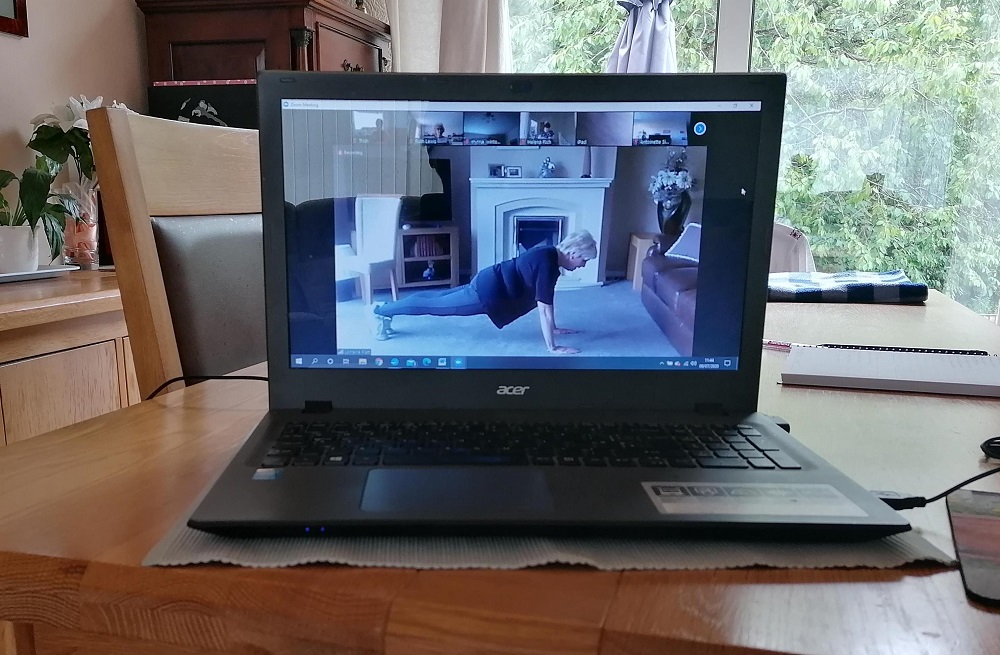 Towards the end of May, she began holding small classes on the meeting platform ‘Zoom’. It was challenging to get everyone tuned in but, two months on, it’s in full swing and so successful that it may continue well into the future.
Towards the end of May, she began holding small classes on the meeting platform ‘Zoom’. It was challenging to get everyone tuned in but, two months on, it’s in full swing and so successful that it may continue well into the future.
Lorraine’s one amazing lady. I first met her in 2017 and produced a write-up for Another Music about one of her groups. I suffered a broken ankle the following year. Then, at a chance meeting, she encouraged me to take up Pilates believing it would help with my recovery. She was right.
Pilates concentrates on three main physical aspects – ‘balance’ ‘core’ and ‘flexibility’. The overall health benefits are wide-ranging. Here are just some of them….
- increased muscle strength and tone, particularly of your abdominal muscles, lower back, hips and buttocks (the ‘core muscles’ of your body)
- balanced muscular strength on both sides of your body
- improved stabilisation of your spine
- improved posture
- rehabilitation or prevention of injuries related to muscle imbalances
- improved physical coordination and balance
- safe rehabilitation of joint and spinal injuries
- increased lung capacity and circulation through deep breathing
- improved concentration
- increased body awareness
- stress management and relaxation
 NMF’s achievement in continuing to connect with their members goes way beyond maintaining good physical fitness though.
NMF’s achievement in continuing to connect with their members goes way beyond maintaining good physical fitness though.
“There is a social element to the group too,” says Lorraine. “So many new friendships have been made through NMF. It is lovely to see, especially in this time of isolation.
I am so pleased to see how the Zoom sessions have taken off. Zoom was a word we had hardly heard of 3 months ago. Now we’re all becoming experts.”
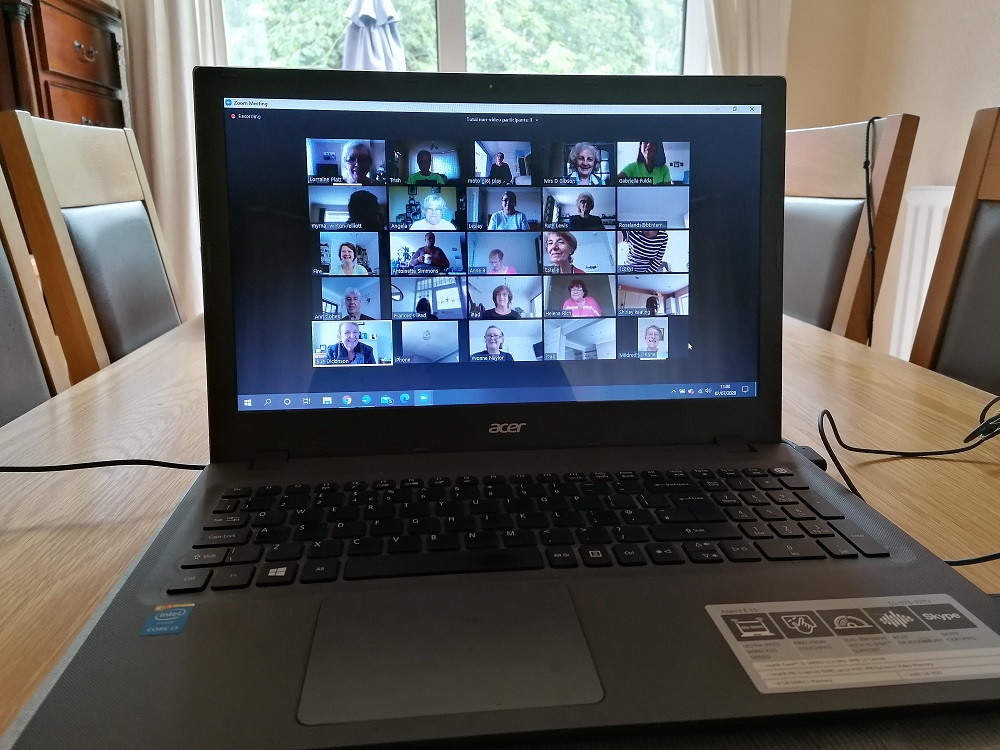 Sharing experiences, photographs, jokes and ideas, the members have helped each other stay positive. They’ve dropped off food supplies, swapped books, CD’s, DVD’s, even spare wool, sent good wishes and flowers to anyone with anything to celebrate and offered support to those suffering illness, bereavement or just the blues. It doesn’t stop there. They’ve knitted blankets, hats and bootees for newborns, ordered, paid for and delivered luxury hand creams to NHS hospital staff, rallied support and sponsored a local charity in desperate need… the list goes on.
Sharing experiences, photographs, jokes and ideas, the members have helped each other stay positive. They’ve dropped off food supplies, swapped books, CD’s, DVD’s, even spare wool, sent good wishes and flowers to anyone with anything to celebrate and offered support to those suffering illness, bereavement or just the blues. It doesn’t stop there. They’ve knitted blankets, hats and bootees for newborns, ordered, paid for and delivered luxury hand creams to NHS hospital staff, rallied support and sponsored a local charity in desperate need… the list goes on.
Behind the scenes, the North Manchester Fitness team have been working on the best, safest way to restart the rest of their activities. Walking in Boggart Hole Clough is a likely candidate.  Some of the regulars on a winter’s day, pre-lockdown
Some of the regulars on a winter’s day, pre-lockdown
In the meantime, Pilates by Zoom suits me…and, no excuses, Lorraine can see if I’m flagging!
Information about North Manchester Fitness activities including Hiitstep, marathon training, sprints, and more can be found on their website, just click here. Or follow them on Facebook.
 Ready for the off!
Ready for the off!
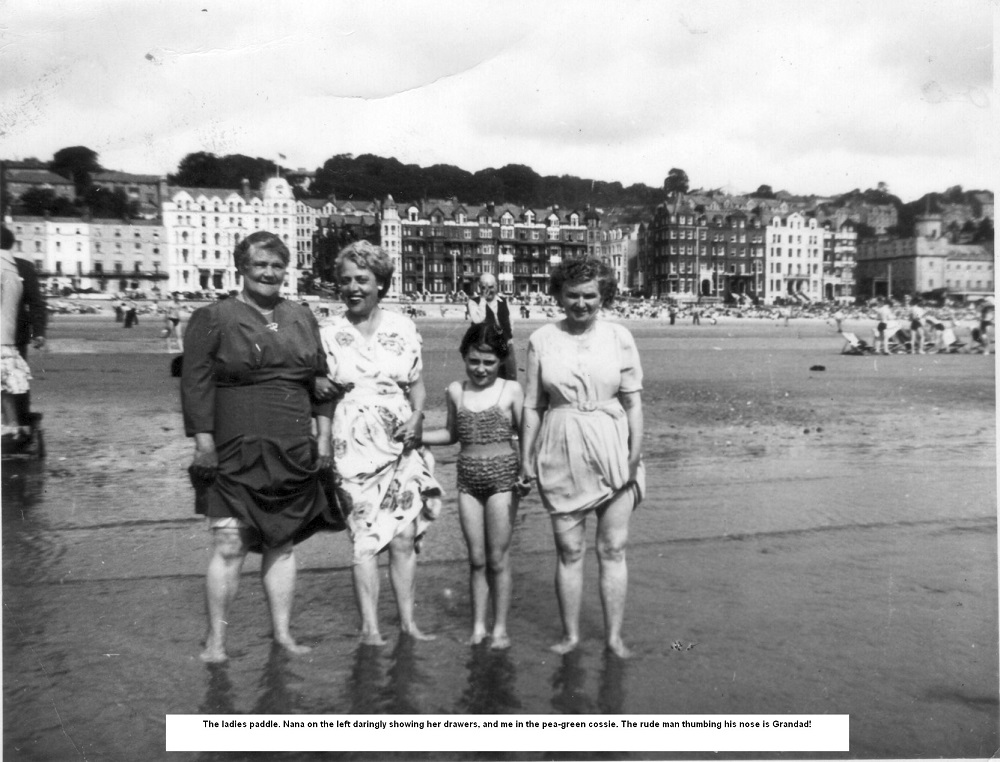 The choice for folk like us was: a holiday camp, a boarding house or caravan. Most of my first holidays were spent at Butlin’s. The camps were to Moston as Narnia was to the real world. Compared to the post war drabness at home, the fresh and brightly painted chalets seemed modern and sophisticated. I slept in a bunk bed and ate three course meals served by a smiling, uniformed waitress – never mind that she dispensed the soup from an earthenware jug rather than a tureen.
The choice for folk like us was: a holiday camp, a boarding house or caravan. Most of my first holidays were spent at Butlin’s. The camps were to Moston as Narnia was to the real world. Compared to the post war drabness at home, the fresh and brightly painted chalets seemed modern and sophisticated. I slept in a bunk bed and ate three course meals served by a smiling, uniformed waitress – never mind that she dispensed the soup from an earthenware jug rather than a tureen.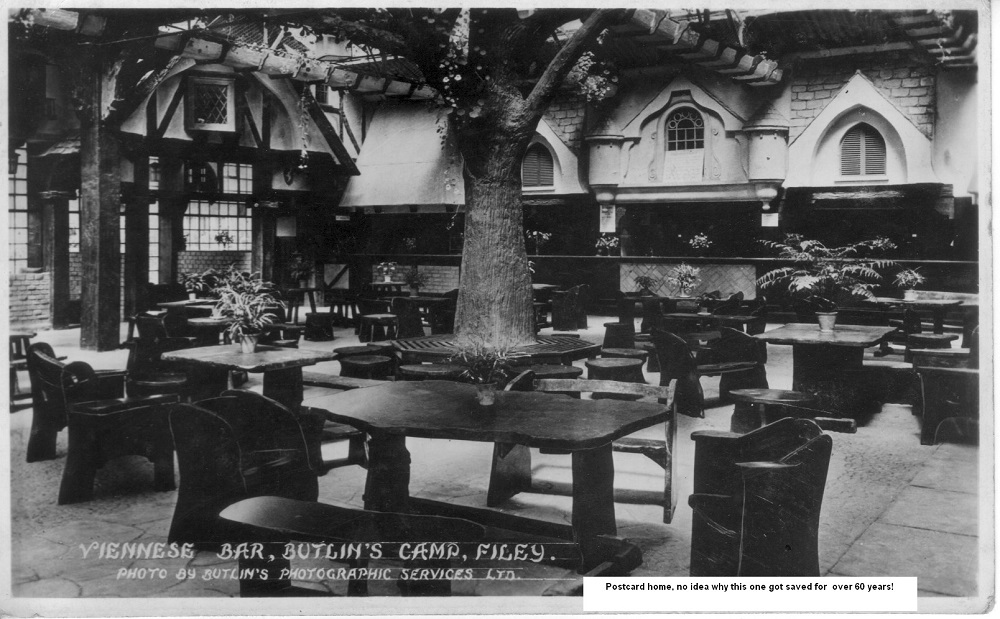 Without it running away with the spending money, children could swim, play crazy golf or enjoy one of the numerous activities organised to keep them entertained. Also for ‘free’, my parents had the choice of a variety show, or indulging their passion for dancing to an excellent band, in one of the lavish ballrooms.
Without it running away with the spending money, children could swim, play crazy golf or enjoy one of the numerous activities organised to keep them entertained. Also for ‘free’, my parents had the choice of a variety show, or indulging their passion for dancing to an excellent band, in one of the lavish ballrooms.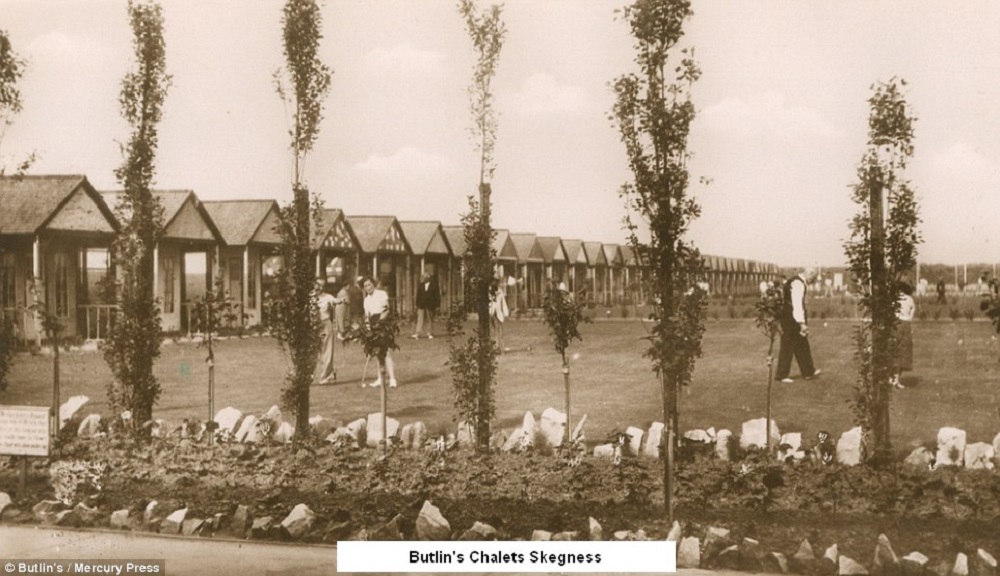 For men in particular, holidays meant freedom to wear comfortable clothing of their own (or their wife’s) choosing. My granddad’s normal work attire was trilby, suit and tie. His version of holiday chic was what he called ‘a jockey cap and duster jacket’. Dad favoured coloured shirts, shorts and sandals. If it wasn’t actually raining, I seem to recall spending most days in a pea green, elasticated swimming costume, plus canvas shoes that were permanently full of sand.
For men in particular, holidays meant freedom to wear comfortable clothing of their own (or their wife’s) choosing. My granddad’s normal work attire was trilby, suit and tie. His version of holiday chic was what he called ‘a jockey cap and duster jacket’. Dad favoured coloured shirts, shorts and sandals. If it wasn’t actually raining, I seem to recall spending most days in a pea green, elasticated swimming costume, plus canvas shoes that were permanently full of sand.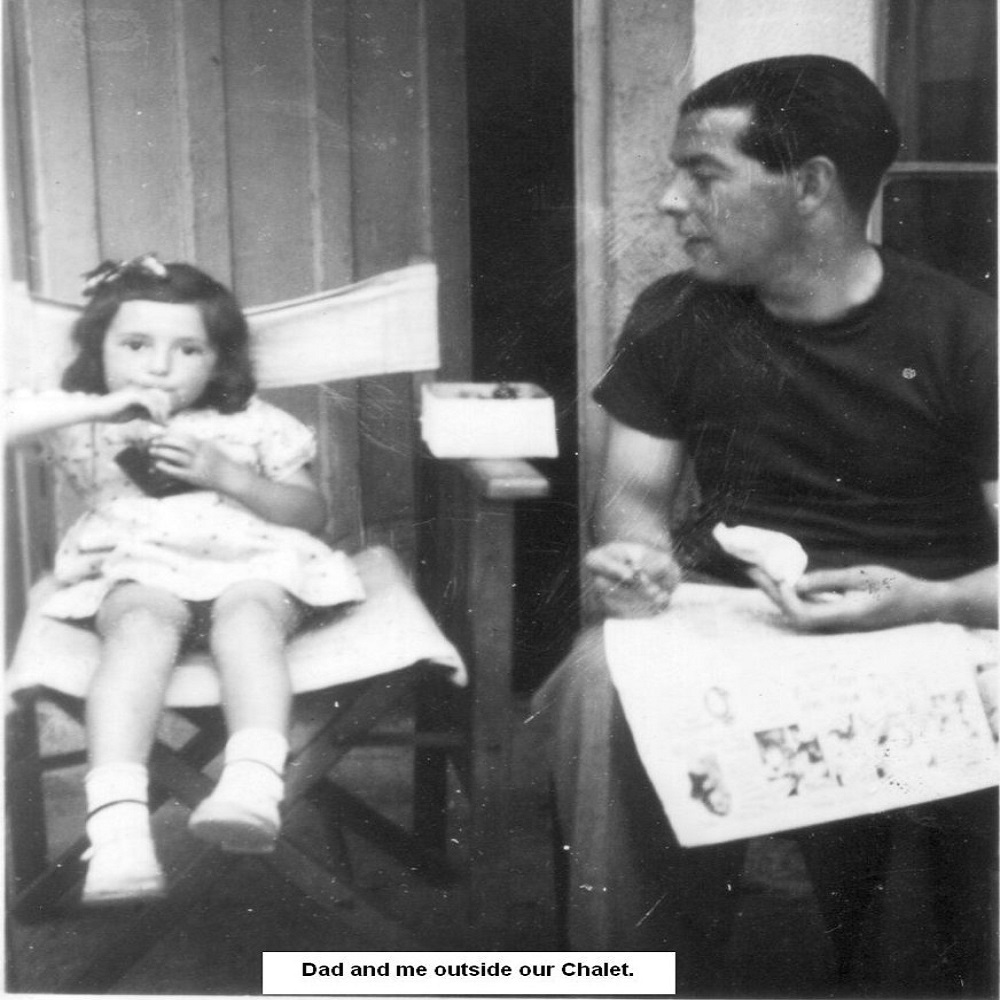 Without doubt, my best travel memories were of the Isle of Man ferry. You could sit on deck or lie about in the saloon on a day bed with tasselled, sausage shaped cushions.
Without doubt, my best travel memories were of the Isle of Man ferry. You could sit on deck or lie about in the saloon on a day bed with tasselled, sausage shaped cushions. Last year, in the name of security, I was treated to an airport body search. Suddenly it made those uncomplicated childhood holidays look positively idyllic – if you don’t count sunburn, insect bites and sand-filled underwear, that is.
Last year, in the name of security, I was treated to an airport body search. Suddenly it made those uncomplicated childhood holidays look positively idyllic – if you don’t count sunburn, insect bites and sand-filled underwear, that is.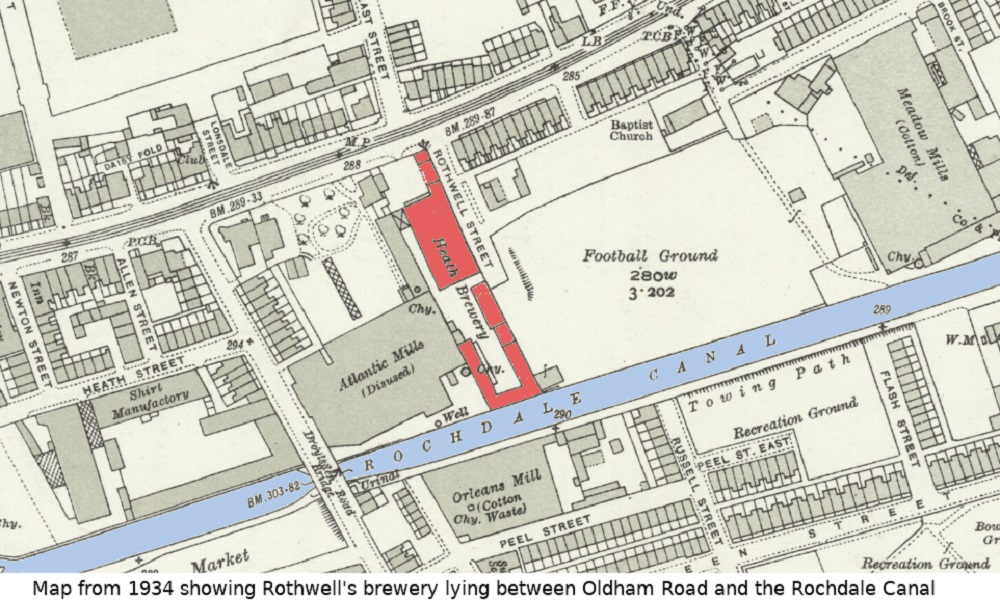 William Thomas Rothwell was born at the curiously named Spout Bank in Heap, near Bury, in 1844, the son of farmer John and his wife Martha. It seems William did not wish to follow his father into farming, because by 1870 he is listed as secretary of the Bury Brewery Company, founded in 1861 on George Street. The 1871 Census gives his occupation as ‘innkeeper and brewer’ living at 96 Georgiana Street, round the corner from the brewery.
William Thomas Rothwell was born at the curiously named Spout Bank in Heap, near Bury, in 1844, the son of farmer John and his wife Martha. It seems William did not wish to follow his father into farming, because by 1870 he is listed as secretary of the Bury Brewery Company, founded in 1861 on George Street. The 1871 Census gives his occupation as ‘innkeeper and brewer’ living at 96 Georgiana Street, round the corner from the brewery.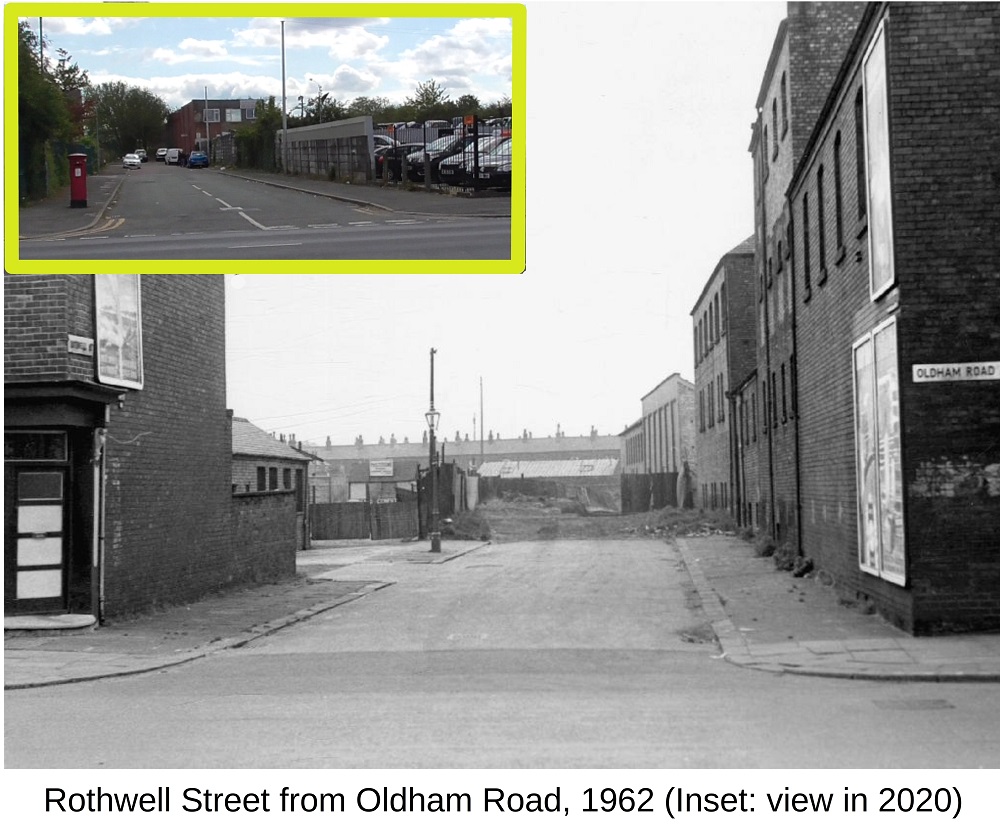 William’s brother Frederick joined him in the business, living across the road on Dob Lane, Failsworth, but suffered a fatal accident on 10 July 1886, when a wort pan boiled over, badly scalding him from the neck down. He was taken to William’s house but despite being attended by doctors, died 3 days later; he was only 33.
William’s brother Frederick joined him in the business, living across the road on Dob Lane, Failsworth, but suffered a fatal accident on 10 July 1886, when a wort pan boiled over, badly scalding him from the neck down. He was taken to William’s house but despite being attended by doctors, died 3 days later; he was only 33.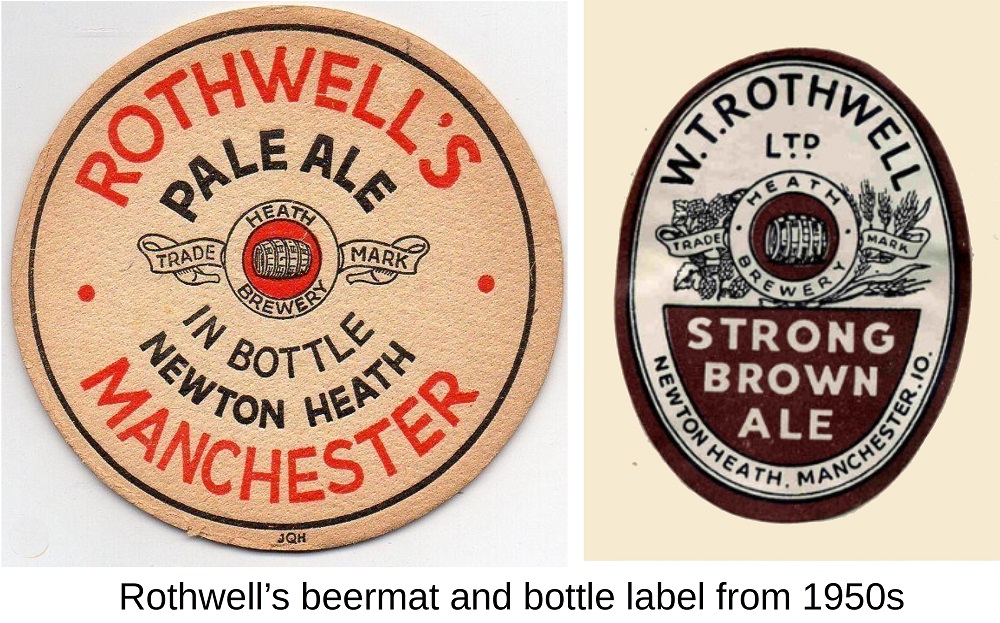 Rival brewers Wilson’s had far more tied houses than Rothwells, who had only 40 or 50; mostly around Newton Heath and Failsworth with a handful in places such as Ashton, Oldham or Stalybridge. A few of these disappeared early in the 20th century, such as the Farmyard Tavern (which it was, literally) on Ten Acres Lane, which closed in 1917. However, quite a few former Rothwells pubs have survived, although you would be forgiven for not recognising them as such.
Rival brewers Wilson’s had far more tied houses than Rothwells, who had only 40 or 50; mostly around Newton Heath and Failsworth with a handful in places such as Ashton, Oldham or Stalybridge. A few of these disappeared early in the 20th century, such as the Farmyard Tavern (which it was, literally) on Ten Acres Lane, which closed in 1917. However, quite a few former Rothwells pubs have survived, although you would be forgiven for not recognising them as such.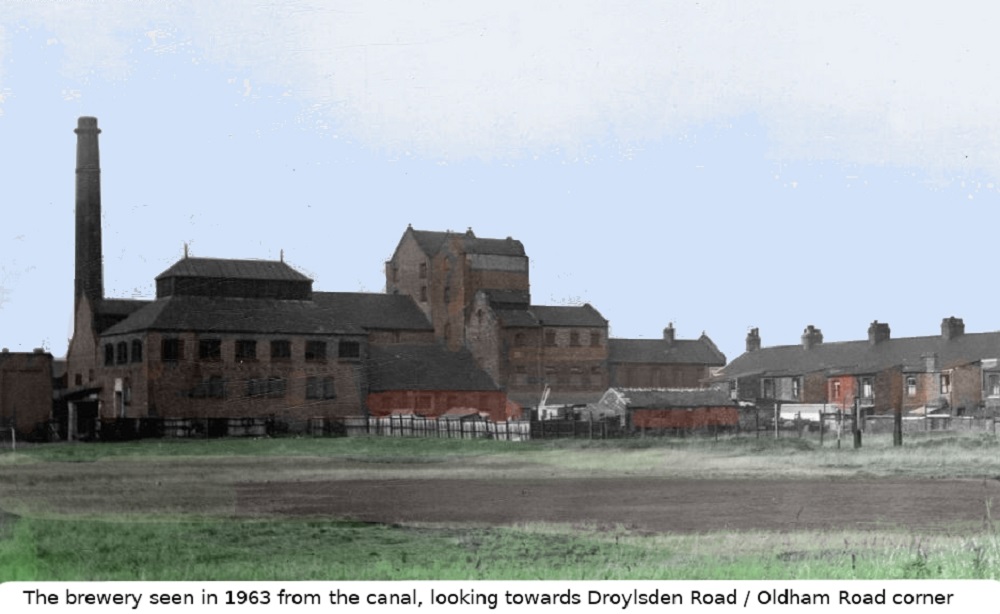 Despite the takeover, many of the pubs still sported Rothwell signage, in tilework, over doorways, or in etched glass windows, for many years. Although refurbishment has removed all traces of their previous ownership nowadays, surviving pubs include the New Crown (Newton Heath), Fox Inn (Stalybridge) and the Wheatsheaf, Pack Horse, Bay Horse, Mare & Foal, Cotton Tree and Dutch Birds (all in Failsworth).
Despite the takeover, many of the pubs still sported Rothwell signage, in tilework, over doorways, or in etched glass windows, for many years. Although refurbishment has removed all traces of their previous ownership nowadays, surviving pubs include the New Crown (Newton Heath), Fox Inn (Stalybridge) and the Wheatsheaf, Pack Horse, Bay Horse, Mare & Foal, Cotton Tree and Dutch Birds (all in Failsworth).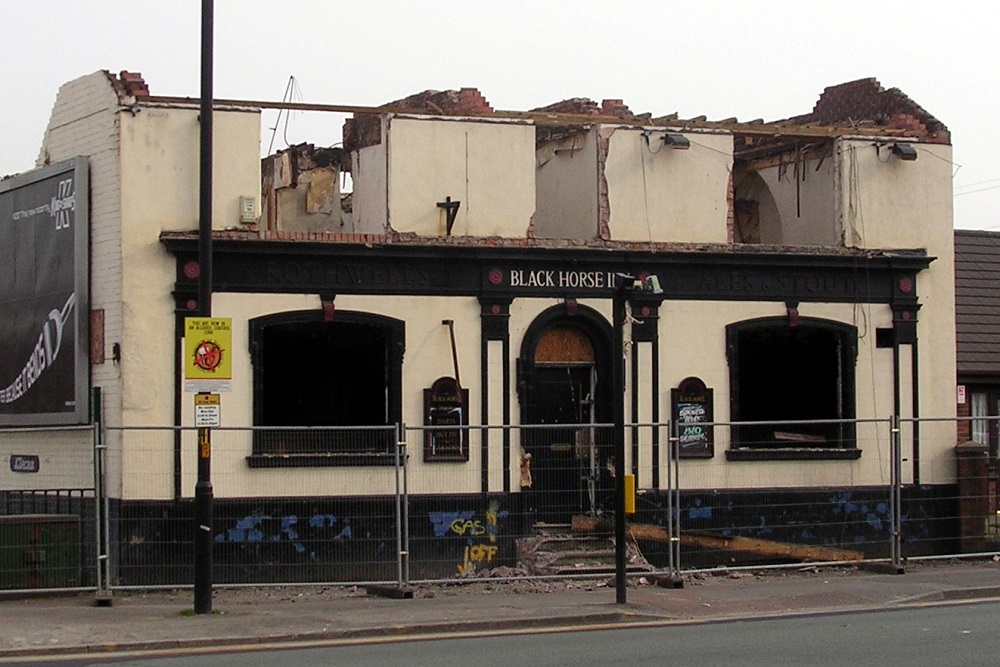 The Black Horse in 2009
The Black Horse in 2009